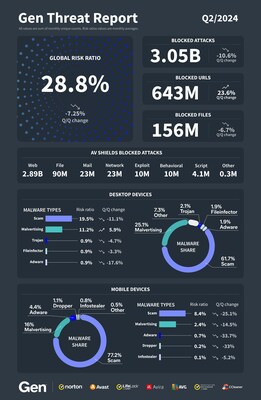Multi-million-dollar Deepfake Campaigns Blocked by Gen
Rhea-AI Summary
Gen's Q2/2024 Threat Report highlights the increasing use of AI in cyberattacks, with cybercriminals leveraging deepfakes and sophisticated scams to target consumers. Key findings include:
1. Gen blocked over 1 billion unique attacks each month, up 46% from last year.
2. 95% of attacks occur during web browsing.
3. Deepfake campaigns resulted in multi-million-dollar losses, including a $5 million cryptocurrency scam.
4. There's a 24% quarter-over-quarter increase in consumer ransomware attacks.
5. Digital identity theft is rising, with InfoStealers and Mobile Bankers targeting personal information.
The report emphasizes the need for increased vigilance and consumer education to combat these evolving threats.
Positive
- Gen blocked over 1 billion unique attacks monthly, demonstrating strong cybersecurity capabilities
- Gen researchers discovered and reported security vulnerabilities to other companies, enhancing overall cybersecurity
- Gen provided free decryption tools for ransomware victims, showcasing corporate social responsibility
Negative
- 46% increase in unique attacks compared to last year, indicating a rapidly growing threat landscape
- 24% quarter-over-quarter rise in consumer ransomware attacks, suggesting increased vulnerability for individual users
- Emergence of sophisticated AI-powered scams, potentially challenging Gen's existing defense mechanisms
News Market Reaction
On the day this news was published, GEN gained 0.27%, reflecting a mild positive market reaction.
Data tracked by StockTitan Argus on the day of publication.
Gen Quarterly Threat Report shows AI-fueled scams, digital identity attacks and ransomware dominating consumer cybersecurity landscape
TEMPE, Ariz. and
"We continue to see cybercriminals expand their toolkits with even more uses of AI to strengthen their attacks," said Siggi Stefnisson, Chief Technology Officer at Gen. "Scammers are cunning and adept at exploiting what is most likely to be on consumers' minds – whether it has to do with elections, love or financial security. Now with AI and other new tech, their schemes are more sophisticated and convincing than ever before. We urge consumers to stay informed and alert. We will continue to keep a watchful eye on the latest threats and provide the latest knowledge and tools needed to be safer despite the evolving threat landscape."
Gen has one of the world's largest consumer Cyber Safety networks protecting people around the globe against advanced online threats. Throughout Q2, Gen Cyber Safety brands blocked over one billion unique attacks each month, up
Gen experts shared some of the most prevalent threats to watch for based on this quarter's findings:
Scammers' Playbook: New and Revamped Tactics
The accessibility and rise of AI allow cybercriminals to add a modern twist to their old tricks to lure more victims. We have seen bad actors using deepfakes of celebrities to promote fake cryptocurrency investment schemes, and now, scammers are targeting widely publicized events that will be broadcast live to draw a large audience. For example, recently, scam group CryptoCore lured victims with highly convincing deepfakes of official events disseminated on compromised YouTube accounts and used QR codes to direct victims to fake crypto giveaway campaigns, stealing
Amid challenging economic conditions, scammers are capitalizing on consumers' needs with part-time job scams that promise quick money by completing simple tasks, like promoting goods on social media. Once trust is established, the scammers convince their victim to send them money so they can steal it. These scams have now evolved from text-based interactions on Telegram to more sophisticated AI-generated voice communications, adding a whole new layer of deception and realism.
This quarter saw the revival of the classic antivirus scam that was first popular in the late 2000s, when cybercriminals were making millions of dollars by selling fake antivirus products. Nowadays, cybercriminals deploy aggressive pop-up alerts that mimic real antivirus programs, often claiming the computer is infected to urge immediate action. These fake alerts abuse the Windows notification system to appear as credible system messages to scare the person into purchasing antivirus software so the scammers can earn commissions through third-party referral programs.
Digital Identity Theft: The New Gold Rush
As large-scale company breaches seemingly become the norm in 2024, cybercriminals turn an eye toward stealing digital identities. Attackers are using direct methods such as Information Stealers (InfoStealers) and Mobile Bankers, going beyond buying data on the Dark Web to snap up consumers' valuable personal information.
InfoStealers breach devices to steal login details, session cookies, passwords and financial information. While InfoStealers saw a slight decline in Q2/2024, notable malware families continue to grow, with the most dominant AgentTesla increasing its market share by 11 %.
Mobile bankers, on the other hand, specifically target mobile devices to steal banking details, cryptocurrency wallets, and instant payments credentials. In Q2/2024, Bankers such as TeaBot, disguised as a PDF reader, targeted Revolut customers. Meanwhile, spyware threats such as XploitSpy and AridSpy are sneaking onto the PlayStore, stealing files and monitoring users through their cameras and microphones.
LifeLock provides a 12-step guide to help people if they believe their identity may have been compromised.
On the Rise: Consumer Ransomware
Consumers remain an attractive target for ransomware as they often have less protection in place than large companies. According to Gen telemetry, there was a
Gen researchers collaborate with governments across the globe to combat ransomware by providing free decryption tools for victims, and most recently released the Avast DoNex Ransomware Decryptor.
To read the full Q2/2024 Gen Threat Report, visit: https://www.gendigital.com/blog/news/innovation/q2-2024-threat-report.
This marks the inaugural Gen Threat Report. Previously, Gen brands separately reported quarterly threat news with the Norton Pulse Report and Avast Quarterly Threat Report. The Gen Threat Report now offers a comprehensive look at the rising threats we monitor and protect our customers from each day and trends we see across the threat landscape.
About Gen
Gen™ (NASDAQ: GEN) is a global company dedicated to powering Digital Freedom through its trusted Cyber Safety brands, Norton, Avast, LifeLock, Avira, AVG, ReputationDefender and CCleaner. The Gen family of consumer brands is rooted in providing safety for the first digital generations. Now, Gen empowers people to live their digital lives safely, privately, and confidently today and for generations to come. Gen brings award-winning products and services in cybersecurity, online privacy and identity protection to nearly 500 million users in more than 150 countries. Learn more at GenDigital.com.
Brittany Posey-Thomas | Courtney Rowles |
Gen | Edelman for Gen |
![]() View original content to download multimedia:https://www.prnewswire.com/news-releases/multi-million-dollar-deepfake-campaigns-blocked-by-gen-302237761.html
View original content to download multimedia:https://www.prnewswire.com/news-releases/multi-million-dollar-deepfake-campaigns-blocked-by-gen-302237761.html
SOURCE Gen Digital Inc.









